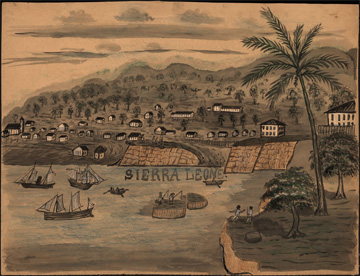Samuel Ajayi Crowther 1807 — December 31, 1891

Samuel Ajayi Crowther was born Ajayi around 1807 in Osogun, Yorubaland, in what is now Nigeria. At approximately age thirteen, Ajayi was enslaved by Oyo and Fulani Muslims who invaded Osogun. Ajayi was traded six times before he was sold to a Portuguese slave-ship captain.
Great Britain abolished the slave trade in 1807 and attempted to suppress illegal traffic using Royal Navy patrols on the coast of Africa. In April 1822, a British patrol stopped and impounded the slave ship that carried Ajayi. The captives on board were transported to the colony of Sierra Leone where they were liberated. Several years after arriving in Sierra Leone, Ajayi experienced a religious conversion. He recalled that “it pleased the Lord to open my heart,” and sought membership in the Anglican Church. Ajayi was baptized by the Anglican Church Missionary Society (CMS) and took the name Samuel Crowther after an eminent clergyman and member of the CMS’s home committee. After his conversion, he became one of the first students to attend Fourah Bay College, a school founded by the CMS in 1827 with the purpose of training Africans in Sierra Leone for Christian service. In 1841 Crowther began his first missionary work in Nigeria.
After this Nigerian Expedition, Crowther went to England and studied at the CMS College in London. His studies there led to his ordination by the Anglican Church in 1843. After his ordination, Crowther and several others opened a new mission in Yorubaland. He made important linguistic contributions, publishing A Vocabulary of the Yoruba Language, and later translating the Bible and The Book of Common Prayers into the Yoruba language.
Crowther returned to England in 1851 to promote his missionary work. He ultimately earned support from the CMS to open a mission along the Niger River with a staff composed entirely of Africans from Sierra Leone. After the success of this mission, Crowther was ordained in 1864 as “Bishop of the countries of Western Africa beyond the Queen’s dominions,” making him the first African Bishop in the Anglican Church. As Bishop, Crowther initiated Christian-Muslim discourse in the Upper and Middle Niger regions.
Over time, racial attitudes and missionary policy in the Anglican Church shifted. European missionaries supported by the CMS believed that the Niger Mission should be run by European missionaries instead of African missionaries. They subsequently attacked Crowther’s mission, discrediting its work, until the staff was entirely replaced by white missionaries. Crowther, distressed by the conflict, died from a stroke on December 31, 1891. A European bishop replaced him.
Though Crowther’s ambitions were quelled toward the end of his life, his ordination as the first African Bishop in the Anglican Church was a milestone in nineteenth-century society. His translations of the Bible and The Book of Common Prayer into Yoruba were instrumental in his pioneering of Christian-Muslim interactions in the Upper and Middle Niger regions.







